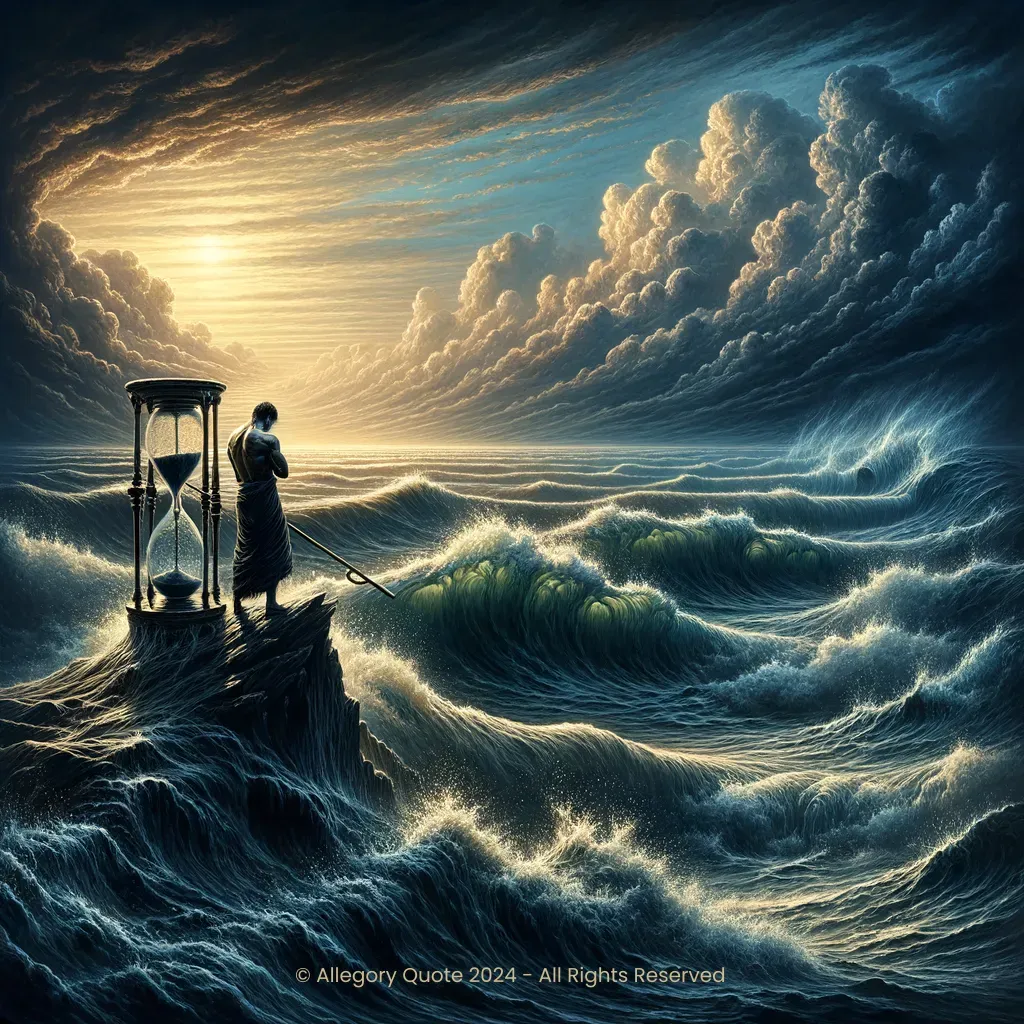”Come what come may,
time and the hour runs through the roughest day“

0
0
0
0
- Meaning
- The phrase "Come what come may, time and the hour runs through the roughest day" carries a message of perseverance and inevitability. It suggests that regardless of the challenges or difficulties one may face, time will continue to move forward, and eventually, even the hardest days will come to an end. This reflects an acceptance of life's uncertainties and an understanding that all struggles are temporary.
- Allegory
- The steadfast figure at the dark, turbulent sea symbolizes resilience in the face of life's difficulties. The serene light on the horizon represents hope and the inevitability of calm following chaos. The rough waters in the foreground mirror the struggles and challenges one faces, while the gentle waves near the shore illustrate the passage of time and the eventual resolution of hardships. The hourglass partially submerged in water symbolizes the unstoppable flow of time, reinforcing the message that even the toughest phases will pass, leading to better moments. This image collectively embodies the essence of perseverance, hope, and comfort conveyed by the phrase "Come what come may, time and the hour runs through the roughest day."
- Applicability
- The meaning of this phrase can be applied to personal life by embracing a mindset of endurance and patience. When facing tough situations, reminding oneself that "time and the hour runs through the roughest day" can provide comfort. It encourages the belief that no matter how difficult a moment may be, it will pass, and better times will follow. It promotes resilience and the ability to stay grounded and hopeful through adversity.
- Impact
- The phrase has made its mark in literature and popular culture, often cited to convey perseverance and the assurance that tough times will pass. Its impact lies in the universality and timelessness of its message, making it relevant across different contexts and eras. It has inspired countless individuals to maintain hope and patience through their struggles.
- Historical Context
- "Macbeth" was written around 1606, during the reign of King James I of England. The play reflects themes of ambition, power, and fate, and it was influenced by the political climate of the time, including the Gunpowder Plot of 1605. Shakespeare's works often explored human nature and societal issues, making them timeless in their relevance.
- Criticisms
- Some criticisms of this phrase could stem from the argument that it promotes a passive acceptance of one's fate rather than encouraging proactive measures to change one's circumstances. Some might see it as suggesting that one should simply wait for time to solve their problems, which might not be practical or effective in all situations.
- Variations
- Variations of this phrase might exist in different cultures, often emphasizing the idea that difficult times are temporary. For instance, various proverbs across cultures deliver the message of resilience and hope, such as the Persian adage "This too shall pass," and similar sentiments are found in numerous other cultural sayings and professional motivational quotes.
-

The empty vessel makes the loudest sound.
-

I must be cruel only to be kind; thus bad begins, and worse remains behind.
-

The smallest worm will turn, being trodden on.
-

The robbed that smiles, steals something from the thief.
-

Some Cupid kills with arrows, some with traps.
-

I am constant as the northern star.
-

There was never yet philosopher that could endure the toothache patiently.
-

The course of true love never did run smooth.
-

Journeys end in lovers meeting.
-

What light through yonder window breaks?
-

I will praise any man that will praise me.
-

By the pricking of my thumbs, something wicked this way comes.
No Comments